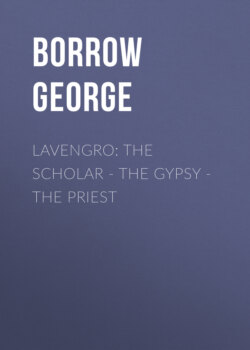Читать книгу Lavengro: the Scholar - the Gypsy - the Priest - Borrow George - Страница 7
На сайте Литреса книга снята с продажи.
V. The Saving Grace of Pugilism.
ОглавлениеTable of Contents
Borrow’s “Flaming Tinman” is, of course, a brilliant success, but then he, though named Bosville, is not a pure gypsy. He is what is called on the roads, I believe, a “half and half”; and in nothing is more clearly seen that “prepotency of transmission,” which I have elsewhere attributed to the Anglo-Saxon in the racial struggle, than in hybrids of this kind. A thorough-bred Romany chal can be brutal enough, but the “Flaming Tinman’s” peculiar shade of brutality is Anglo-Saxon, not Romany. The Tinman’s ironical muttering while unharnessing his horse, “Afraid. H’m! Afraid; that was the word, I think,” is worthy of Dickens at his very best—worthy of Dickens when he created Rogue Riderhood—but it is hardly Romany, I think.
The battle in the dingle is superb.
Borrow is always at his strongest when describing a pugilistic encounter: for in the saving grace of pugilism as an English accomplishment, he believed as devoutly almost as he believed in East Anglia and the Bible. It was this more than anything else that aroused the ire of the critics of “Lavengro” when it first appeared. One critical journal characterised the book as the work of a “barbarian.”
This was in 1851, when Clio seemed set upon substituting Harlequin’s wand for Britannia’s trident, seemed set upon crowning her with the cap and bells of Folly in her maudlin mood—the marvellous and memorable year when England—while every forge in Europe was glowing with expectance, ready to beat every ploughshare into a sword—uttered her famous prophecy, that from the day of the opening of the Prince Consort’s glass show in Hyde Park, bullets, bayonets, and fists were to be institutions of a benighted past.
Very different was the prophecy of this “eccentric barbarian,” Borrow, especially as regards the abolition of the British fist. His prophecy was that the decay of pugilism would be followed by a flourishing time in England for the revolver and the assassin’s knife—a prophecy which I can now recommend to those two converts to the virtues of Pugilism, Mr. Justice Grantham and the present Editor of the Daily News, the former of whom in passing sentence of death (at the Central Criminal Court, on Wednesday, January 11th, 1893) upon a labourer named Hosler, for stabbing one Dennis Finnessey to death in a quarrel about a pot of beer, borrowed in the most impudent manner from the “eccentric barbarian,” when he said, “If men would only use their fists instead of knives when tempted to violence, so many people would not be hanged”; while the latter remarked that “the same thing has been said from the bench before, and cannot be said too often.” When the “eccentric barbarian” argued that pugnacity is one of the primary instincts of man—when he argued that no civilisation can ever eradicate this instinct without emasculating itself—when he argued that to clench one’s fist and “strike out” is the irresistible impulse of every one who has been assaulted, and that to make it illegal to “strike out,” to make it illegal to learn the art to “strike out” with the best effect, is not to quell the instinct, but simply to force it to express itself in other and more dangerous and dastardly ways—when he argued thus more than forty years ago, he saw more clearly than did his critics into the future—a future which held within its womb not only the American civil war and the gigantic Continental struggles whose bloody reek still “smells to heaven,” but also the present carnival of dynamite, the revolver, and the assassin’s knife.
